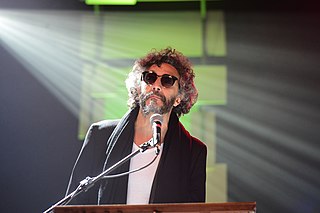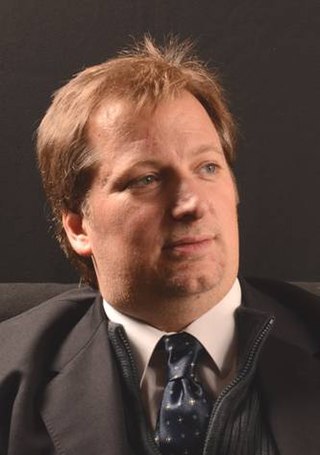
Uruguay, officially the Oriental Republic of Uruguay, is a country in South America. It shares borders with Argentina to its west and southwest and Brazil to its north and northeast, while bordering the Río de la Plata to the south and the Atlantic Ocean to the southeast. It is part of the Southern Cone region of South America. Uruguay covers an area of approximately 176,215 square kilometres (68,037 sq mi). It has a population of around 3.4 million, of whom nearly 2 million live in the metropolitan area of its capital and largest city, Montevideo.

The most distinctive music of Uruguay is to be found in the tango and candombe; both genres have been recognized by UNESCO as an Intangible Cultural Heritage of Humanity. Uruguayan music includes a number of local musical forms such as murga, a form of musical theatre, and milonga, a folk guitar and song form deriving from Spanish and italian traditions and related to similar forms found in many American countries.

Carlos Gardel was a French-born Argentine singer, songwriter, composer and actor, and the most prominent figure in the history of tango. He was one of the most influential interpreters of world popular music in the first half of the 20th century. Gardel is the most famous popular tango singer of all time and is recognized throughout the world. Described variously as a baritone or tenor because of his wide vocal range, he was known for his rich voice and dramatic phrasing. Together with lyricist and long-time collaborator Alfredo Le Pera, Gardel wrote several classic tangos.

Tacuarembó is the capital city of the Tacuarembó Department in north-central Uruguay.

Rodolfo Páez, popularly known as Fito Páez, is an Argentine popular rock and roll musician and filmmaker.

Jorge Abner Drexler Prada is a Uruguayan musician, actor and doctor specializing in otolaryngology.

Juan Campodónico, sometimes working under his stage name Campo, is an Uruguayan musician, producer, composer, creator and former member of El Peyote Asesino, Bajofondo and Campo. He produced albums by Jorge Drexler, Luciano Supervielle, Bajofondo, El Cuarteto de Nos, La Vela Puerca, OMAR, Sordromo, No Te Va Gustar, Santullo and Ximena Sariñana among others. He created the Bajofondo project alongside iconic producer and two-time Academy Award winner for Best Original Score Gustavo Santaolalla. He has been awarded with various Latin Grammy, Premios Gardel and Graffiti awards for his work as a producer, as well as with many golden records.

Cinema of Argentina refers to the film industry based in Argentina. The Argentine cinema comprises the art of film and creative movies made within the nation of Argentina or by Argentine filmmakers abroad.

The Life of Carlos Gardel is a 1939 Argentine musical film directed by Alberto de Zavalía and starring Hugo del Carril, Delia Garces and Elsa O'Connor.

The cinema of Uruguay has a role in the culture of Uruguay and is a part of Latin American cinema. Since the late 1990s, Uruguayan cinema has undergone a process of evolution, during which its films have received positive reviews and been internationally recognized. Over 120 films, fiction and non-fiction, have been produced since then.

Jorge Alberto Lepra Loiodice was a Uruguayan diplomat and politician.

Terig Tucci was an Argentine composer, orchestrator, conductor, violinist, pianist, and mandolinist. He was a leading advocate of music for the tango in the United States who collaborated with the singer Carlos Gardel.

A Useful Life is a 2010 Uruguayan drama film about the love of film, directed by Federico Veiroj and shot in black-and-white. The film was selected as the Uruguayan entry for the Best Foreign Language Film at the 83rd Academy Awards but it did not make the final shortlist.

Uruguayans are people identified with the country of Uruguay, through citizenship or descent. Uruguay is home to people of different ethnic origins. As a result, many Uruguayans do not equate their nationality with ethnicity, but with citizenship and their allegiance to Uruguay. Colloquially, primarily among other Spanish-speaking Latin American nations, Uruguayans are also referred to as "orientals [as in Easterners]".

Tangos, the Exile of Gardel is an Argentine-French film released on 20 March 1986, directed by Fernando Solanas, starring Marie Laforêt, Miguel Ángel Solá and Philippe Leotard. The film was selected as the Argentine entry for the Best Foreign Language Film at the 59th Academy Awards, but was not accepted as a nominee.
The Battle of Tacuarembó took place between the Luso-Brazilian forces under the command of José de Castelo Branco Correia, Count of Figueira, and the Artiguist forces of Andrés Latorre in Tacuarembó, modern-day Uruguay.

Valle Edén is a hamlet in the valley of the same name in Tacuarembó Department, Uruguay.

Eduardo Cuitiño Bosio is a Uruguayan writer/author and mathematician known for his investigations and essays on two historic figures: Carlos Gardel and Jack the Ripper.

Suburban Melody is a 1933 American pre-Code musical film directed by Louis J. Gasnier and starring Imperio Argentina, Carlos Gardel and Vicente Padula.

















